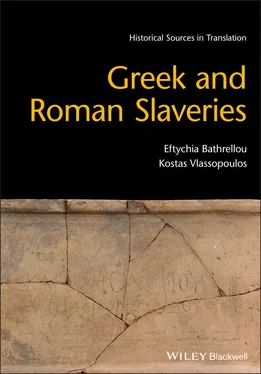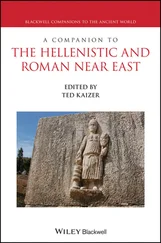What do we learn about the slave’s professional activities?
How does the slave describe himself?
In whose voice does the text speak? Does this imply that it was composed by the slave himself? Compare with 7.39.
How useful is this inscription for understanding slavery?
2.23 Phaedrus, Fables , 3, Prologue, ll. 33–7: Latin Verse Fable (First Century CE)
Literature: Bradley 1984: 150–3; Hopkins 1993; Rothwell 1995; Champlin 2005.
I will now explain briefly why the genre of fables was invented. Because slavery, being at the mercy of everyone and everything, did not dare to say what it wanted, it transferred its true sentiments into fables and avoided censure by jesting with made-up stories.
Why does the passage present fable as servile discourse?
Compare with 4.21, 5.18, 7.8, 7.34, 9.19. Do these fables represent a slave point of view?
2.24 Theodoret , Religious History, 9.9: Greek Biography of Ascetics (Fifth Century CE)
At this part of his biography of Peter of Galatia, an ascetic active in the early fifth century CE, Theodoret narrates events connected with the relationship between Peter and Theodoret’s own mother, a wealthy woman of Antioch.
Literature: Klein 1982.
At another time, my mother took a slave cook who was being perturbed by an evil demon to Peter, and begged for his help. The divine man prayed and ordered the demon to reveal the cause of his power over this creature of God. And he, like a murderer or a robber standing before the court and ordered to speak of his crimes, started to go through everything, forced by fear to tell the truth, although this was not his habit. So, he was saying that in Heliopolis the slave’s master had fallen ill and, since he was ill, the mistress was sitting by her husband’s side. And the slave girls of the mistress of the house in which they lived were relating the lives of the monks who led philosophical, ascetic lives in Antioch and of the great power they have against demons. Then the slave girls, like children playing and having fun, pretended to be possessed by demons and to have gone mad, while that slave, draped in a coat, pretended to exorcise them in the way of the monks. “During this performance,” the demon said, “I was standing by the door and could not bear those boastful stories about the monks. So, I wanted to test the power the slaves impetuously claimed the monks had. With this in mind, I left the slave girls alone and entered this man, wishing to find out how I might be expelled by the monks. But now I have indeed found out and had enough of tests. So, I will immediately come out of him, upon your command.” Upon saying these words, the demon started to flee, whereas the slave cook to enjoy his freedom.
What activities among slaves does the story report?
What is the relationship between slaves and Christianity as depicted in this passage?
Who narrates the events which took place at Heliopolis? How does this affect the veracity of the story?
Can we take this story at face value? Or is this a fantasy of what masters thought slaves might be doing behind closed doors?
What freedom did the slave cook start to enjoy at the end?
2.25 Saint Patrick, Confession , 1, 16–9: Christian Autobiographical Text in Latin (Probably Fifth Century CE)
Saint Patrick was the son of a local dignitary in Roman Britain; after being captured and sold as a slave in Ireland in the early fifth century CE, he managed to escape, before returning to Ireland years later as a Christian missionary. While many later texts about Patrick are legendary, the authenticity of this text is generally accepted.
Literature: Thompson 1985: 16–34; McLuhan 2001; Rio 2017: 30–1; Beavis 2020.
1: I, Patrick, a sinner most ignorant of city ways, the least of all the faithful and most contemptible in the eyes of many, was the son of the deacon Calpurnius, son of the presbyter Potitus, who was from the settlement of †Bannavem Taburniae†. He had a small estate nearby, and I was captured there. I was about 16 years old at the time. I did not know the true God and was taken to Ireland in captivity with so many thousands of people. This we deserved because we had gone away from God and did not keep His commandments; nor did we obey our priests, who used to admonish us for our salvation.
16–19: But after I arrived in Ireland – and so I used to tend the sheep every day and pray many times a day – my love of God set in more and more and so did my awe of Him. And my faith increased, and my spirit was stirred, so that in one day I would say up to a hundred prayers and almost the same at night. I even used to stay out in the forests and on the mountain, and I would rise for prayer before dawn in snow and frost and rain. And I never felt unwell, nor did I show any laziness because, as I can now see, the Spirit was burning inside me at that time. And it was there that one night, in my sleep, I heard a voice telling me: “You fast well. You will soon return to your homeland.” And again, after a little time, I heard a prophetic voice saying to me: “Look! Your ship is ready!” And it was not nearby, but about 200 miles away, at a place where I had never been nor did I know anyone. And then, shortly afterward, I fled and left the man with whom I had been for six years. I went “in the power of God,” who directed my path to the good and, until I reached that ship, I was in no fear of anything.
The day I arrived, the ship was about to set off from that place. I said that I had the means to sail with them. The captain was not pleased with this and replied harshly and indignantly: “Don’t even try to come with us!” When I heard this, I went away from them, to return to the hut where I was staying. On the way, I began to pray and, before I had completed my prayer, I heard one of them crying loudly after me. “Come quickly! These men are calling you!” Immediately I returned to them, and they began to say to me: “Come! We trust and admit you. Show your friendship to us in any way you like’. […] We set sail immediately. After three days we reached land, and for 28 days we journeyed through deserted wild country. They ran out of food and hunger overtook them. […]
The captain, who is a pagan, asks Patrick to pray to God for food; he complies.
And, with God’s help, this came to pass. Look! A herd of swine appeared on the road in front of our eyes! They slaughtered many of them and stayed there for two nights. They ate well, and their dogs, too, were filled. For many of them had become weak and had been left half dead by the road. After this, they gave their utmost thanks to God, and I became honored in their eyes. And from that day onward, they had food in abundance.
How does Patrick describe his experience of slavery?
How realistic is his description of the flight? What elements are left undiscussed? What can we learn about slave flight from this?
Why does Patrick give more space to describing his escape than his life in slavery?
What do you think is the purpose of this narrative? How does it affect its historical reliability?
How useful is this narrative for understanding the experience of slavery?
1 26 Eranistai, literally contributors to a collection, refers either to an ad hoc group financing something, or to a more permanent association, financed by its members’ contributions.
2 27 A term often used in Rhodian inscriptions to describe slaves born locally.
3 28 1 stater = 2 drachmas.
4 29 Hegesandros of Sounion and his brother Hegesippos (nicknamed Hair-bun; see later) were prominent Athenian politicians of the time.
5 30 Term used affectionately of a woman who cared for a small child without necessarily being the child’s biological mother or wet-nurse.
Читать дальше












